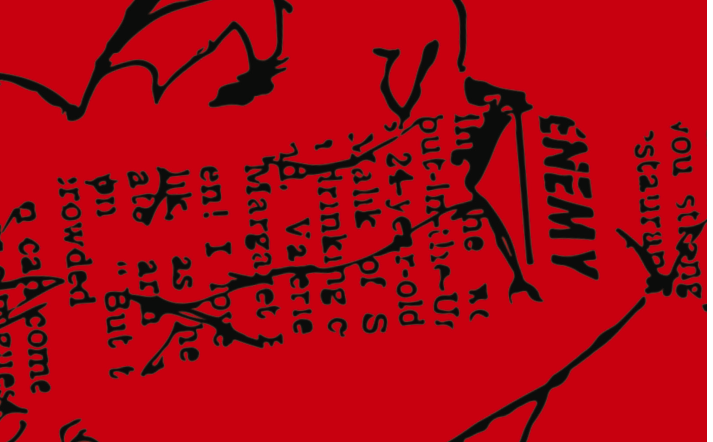
Fragmented at Best
It is a strange day when Classics Twitter unites. Yes, you read that correctly: a subsection of the notoriously polemical app is given to the study of the Ancient World, dedicated to joking about the tragedians and assessing the new Pericles reference à la Johnson. What Classics Twitter does best, however, is bicker. For all our love and reverence for the same discipline, a day never passes without discourse over teaching methods, philological rigour or the dubious figures in the subject’s past. It is a microcosm of a scholarly community; one which uses tweets instead of targeted footnotes to make snide comments—no So, when there is an almost unanimous train of thought on the classical timeline, one cannot help but notice.
The cause of this unifying uproar? A book review in the December edition of the Bryn Mawr Classical Review (BMCR for short), an open access journal that is, for many scholars, the first casual look into new publications . The blasphemous review in question was of a book on fragmented, incomplete objects of the Ancient World, edited by scholars S. Martin and Stephanie Langin-Hooper. The reason for such a vehement rejection lies in the review’s style: it was written not as a conventional academic review but as an experiment in poetry. As a fragmented approach to a book on broken material culture, the review was a stylistic attempt at a dialogue between—in the author, C.M. Chin’s own words—“very small (and very large) objects, material and intellectual.” Yet crucially, the dialogue managed to forget its role in bridging the gap for the as-yet uninformed reader; to even the brightest of Classics Twitter, the association of the Punic goddess Tanit with “a woman’s restroom icon” was baffling without further context. Chin fashioned a verbal display so impenetrable for the reader that it seemed like a performance of and for himself. Written in a state of wilful ignorance as to whether others could understand his ‘genius’ or not, he put himself and his esoteric words at the heart of a review of a book which was not his own.
Most egregiously perhaps, comes a genuine confession of ignorance, meant either to be deep or humorous (I am yet to decide which):
“-I liked the part about Gordon Matta-Clark, even though I don’t know anything about Neolithic holes.
-Nobody does, that’s the point. Or what holes even are. Any holes, what they are. I don’t know.”
What could very well have been a mightily poetic response to the beautiful and complicated remains of the Ancient World was metamorphosed, or more precisely, repackaged, into a review of a genuine scholarly work, one of whose authors was up for tenure assessment. A book review for an Early Career Researcher (ECR – someone within eight years of having submitted their PhD) is not the place to be edgy or obscurantist, especially when that scholar relies on the review and journal platform to reach a wider academic audience. And perhaps that also informed the outrage: scholarship cannot exist without scholars, and scholars cannot exist without being assessed by their peers. The review took centre stage when it was at best meant to be a supporting act to the main gig, the original book. Academia can be thought of as a heated tug of war for the baton or microphone just as easily as it can be the “pursuit of research, education and scholarship,” as the Oxford English Dictionary so docilely puts it. There is a hierarchy of who is allowed to speak and when; ECRs such as Langin-Hooper are not high up on that list. They instead rely on the words of others to affirm their academic roles. The review stood out to me as highlighting two age-old issues within humanities scholarship: the precarity of the enterprise, and the question of why academic writing is as it is.
I took fault with the review because of just how incomprehensible it was, but sensed that for many others, their great attachment to traditionalism (not necessarily what a review should achieve, but what it should look like) immediately denounced its experimentation. As it stands, this domino effect of needing to be both regarded and analysed by your academic peers implicates risk for the scholar wanting to push the envelope as well as for those around them. It is a system of publish or perish in which many seem overworked, underpaid, and by nature overly critical. On Twitter, amidst memes about Odysseus’ infidelity or how useless Aeneas is, you’d be hard pressed not to find witty remarks on just how tempted people are to leave academia, telling younger aspiring scholars to run for the hills.
More broadly, humanities academia wishes to distance itself from the critical epithet of the ‘ivory tower’ levelled against it: the idea that the Humanities possess little relevance for the outside world, that they make up overly intellectualised academic problems for their own privileged few to ponder, and verbalise through a disingenuous style at that. To live up to this stereotype would be for the Humanities to put a nail in its own coffin. On the other side of scepticism, there is the accusation that Humanities scholarship is dwindling in quality and purpose. One hears a constant lamentation on the death of the Humanities by an often right-wing crowd in op-eds for Quillette or UnHerd, convinced it is the academics themselves bringing about the bitter end to the precious study of (usually ‘Western’) civilisation. The argument follows that these academics are digging their own disciplines’ graves by giving into the political correctness of a left-wing mob. Surely, we have fallen from Humanistic grace when the Oxford Classics faculty is considering removing the Iliad and Aeneid from its syllabus? This hysteria in fact proved misdirected at conversations about moving, not removing, these papers from the degree’s first half to its second. Postmodernism and overly radicalised professors are the bogeymen for this avowedly anti-intellectual yet purportedly pro-humanities stance. Against such accusations, can we blame humanities academia for its distinct aura of self-justification?
There is cause to think that the Humanities are suffering a kind of death—just not the kind which the op-eds would have you believe. It’s becoming more and more common for university administrations to slate their Humanities programmes as an economically-driven choice. Illinois’ Wesleyan University, whose president is, bizarrely, the classical scholar S. Nugent, recently announced its Classics department is headed for the guillotine. Leicester has chosen to cut posts in medieval literature under the disingenuous guise of “decolonisation”, when it’s really a gross attempt to justify widespread redundancies in the English faculty. For subjects like Classics, holding a specific cultural importance in certain milieus of society is no longer enough to combat growing institutional insecurity.
In light of this, it can seem strange to hone in on academic writing style, but the two are inextricably linked when the former takes on a protective aim. Academic writing is meant to be the most cooperative display of information, both in presentation and learnedly informative to its initiated participants: surely it makes sense that not everyone can understand a mathematical proof or Old Norse passage? Granted, there are certain features of acceptable incomprehensibility which are understood by those within a field. Yet, when we analyse what counts as informative to even this restricted audience, academic writing fails to meet the standard of communication.
For a review, the writer’s intent should be to summarise the main points and claims of the book in question—in this respect, Chin evidently failed. His indulgent use of dense jargon and textual polyglossia, not an uncommon feature of academic writing but amplified here, rendered his article deliberately uncooperative. This inaccessibility emerges especially when his writing is assessed through a linguistic theory of conversation, the cooperative principle, as coined by philosopher-linguist Grice: you and your interlocutor want to achieve the same aim by your verbal interaction, and for that, the information provided is done in a truthful, relevant and clear manner. Chin’s text violates the principle of being as informative as is required “for the purposes of its exchange” within the BMCR, as Grice’s cooperative principle states. Though not a typical style of academic writing at all, Chin’s self-gratifying review is an excellent representation how frequently this corpus discards assumed communicative goals.
Sometimes, this academic exclusivity is unintended, but when it comes to prized exclusivity, Classics as a field—or at least, anglophone Classics—uniquely protrudes. Harry Mount, the British author and key player in the Homer-Virgil-Oxford complaint crowd, mentions the self-importance classicists bestowed upon themselves, in part owing to the perceived burden of being a “self-selecting bunch”. A wry anecdote of the no-smoking sign in the Oxford Fellows Room speaks to the degree’s (former) linguistic exclusivity: written only in Ancient Greek, it was an exclusivity Betjeman found endlessly amusing, and which Mount now realises showed “the worst kind of classicist snobbery”. That insistence on learnedness has been reflected in Classics’ writing, in its idealised expectation of the reader: a reader for whom the swathes of untranslated Latin and Greek, liberally sprinkled French terms, and chunks of quoted German scholarship are no matter.
***
“Now. How to decentre Augustan Rome, re-focalise The Age? Not my way, obviously! I.e. to read through Georgics ~ Aeneid and Horatian lyric, parse Propertius’ oeuvre, give Tibullus his due, track Ovid urbi et ubique. (Yes, I do know. Poesie gets at most 2/19 here vs. 4/16 in Galinsky.)”
“Russell and Hillard cross perspectives on the dynamics of Augustan politicking over the versions of the pater patriae melodrama in Suetonius and Dio: ‘consensus ritual’ kultchur ~ ‘self-infantilization’ tr*mpery.”
If you’re looking for who to thank for yet another strangely written BMCR review, look no further than esteemed Cambridge classicist John Henderson. The Life Fellow at King’s College came under similar, if more subdued, Classics Twitter fire a few months prior to Chin for his stream of consciousness reviews. For as many as there were who called him “self-congratulatory”, “obfuscating”, “opaque”, others deemed the head-banging required to “get it” worthwhile. ‘Proper’ scholars appreciate Henderson’s style amidst an increasingly and disappointingly innocuous approach to scholarship seen elsewhere, or so the argument went, though I’m not sure where his peppering of school-boy “tally-ho”s feeds into that.
Analysing Henderson, it transpires that he, like Chin, fails to abide by a cooperative principle: one need only look at the semantic leaps in “kultchur ~ ‘self-infantilization’ tr*mpery”. The biggest betrayer of his self-indulgent writing is the constant reference to other scholars. Otherwise known as metadiscourse, this tactic is used by academics to situate themselves within their field amidst predecessors, but cloaked as a signposting technique beneficial to the reader. Uniquely, however, Henderson’s metadiscourse broadly features names, not arguments; the mention of “Galinsky”, “Russell”, and “Hillard” doesn’t really reveal much, unless one is clued up enough to understand the meaning of 2/19 or 4/16.
There is a certain arrogance to older kinds of writing, a kind of name dropping, polyglottic approach which is amenable to some researchers and students today but certainly not all. Yet, when a certain few are characterised by, and even lauded for their ostracising quirkiness, as Henderson often is, response takes the form of “oh, that’s just X’s style”. Henderson’s verbal obscurity is protected by its sense of tradition, written in an intellectual air of the past, and which admittedly shaped its author’s academic career.
Perhaps here is not the case of writing to inform, but writing for a select few, and quite pointedly so as to not inform others. Academics talking in code is the ultimate form of a protected and protective communication. This is not a use of technical speech at its most semantically precise meant to convey efficiently to a certain academic audience, and thus rendering incomprehensibility to the layman an unfortunate side-effect. Instead, obfuscation is the goal. Exclusivity becomes a defensive strategy by which the Humanities can both lock out criticism and give more fuel to their own academic heft.
Like fortified cities under attack, humanities departments are having to fight to avoid closure, and resist rife anti-intellectual sentiment. How high must academia build its walls? My answer would be, high enough to protect its integrity, to avoid the constant scepticism about its supposed uselessness. However, despite increasingly institutional insecurity, departments must not build their walls so high that they become a place of stagnation, devoid of youthful excitement and the ideas of an incoming generation of scholars. Academic writing is a specialised discourse and ought to remain that way, having rightly created its own language off the back of a vast intellectual corpus. But a unifying factor in any given field should be the case for its existence and future; the current and historically maintained conventions of academic writing serve to undermine both.
There is room for tradition, room for protection, and also room for growth in academic writing, all at the same time. A degree of exclusive learnedness is an innate feature of any specialised discourse, to be sure, otherwise its academic study would remain unjustified. Uncooperativeness with the reader-speaker, however, is not. Chin and Henderson’s reviews, in their exaggerated forms, point to a trend of inaccessibility in academic writing which need not be there, and which in fact acts negatively against their field’s future. Though the marriage of learnedness and accessibility is not necessarily easily won, a ‘kultchur’ of academic obscurantism won’t help get us there either. In a world of Chins, Hendersons, and arrogant Betjemans, perhaps the best future-forward route to take in academic writing is that of the benign interlocutor, the clear writer, if only—for the time being—to avoid being the weekly debate topic for Classics Twitter. ∎
Words by Kiana Rezakhanlou. Art by Natalie Hytiroglou.







